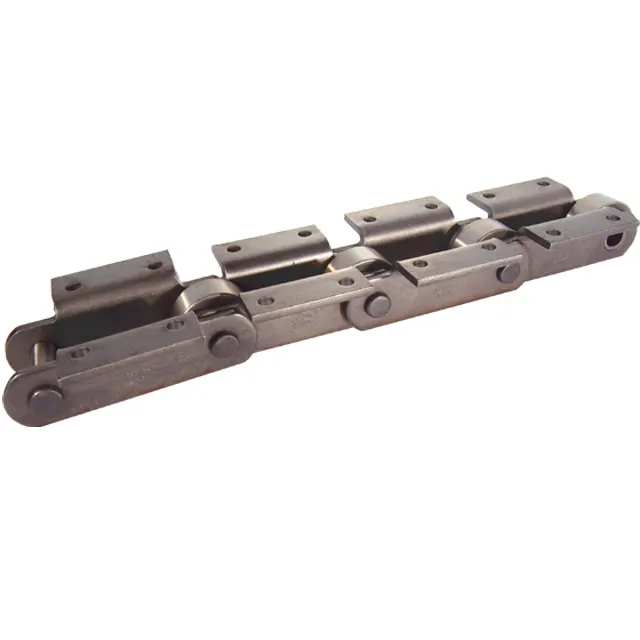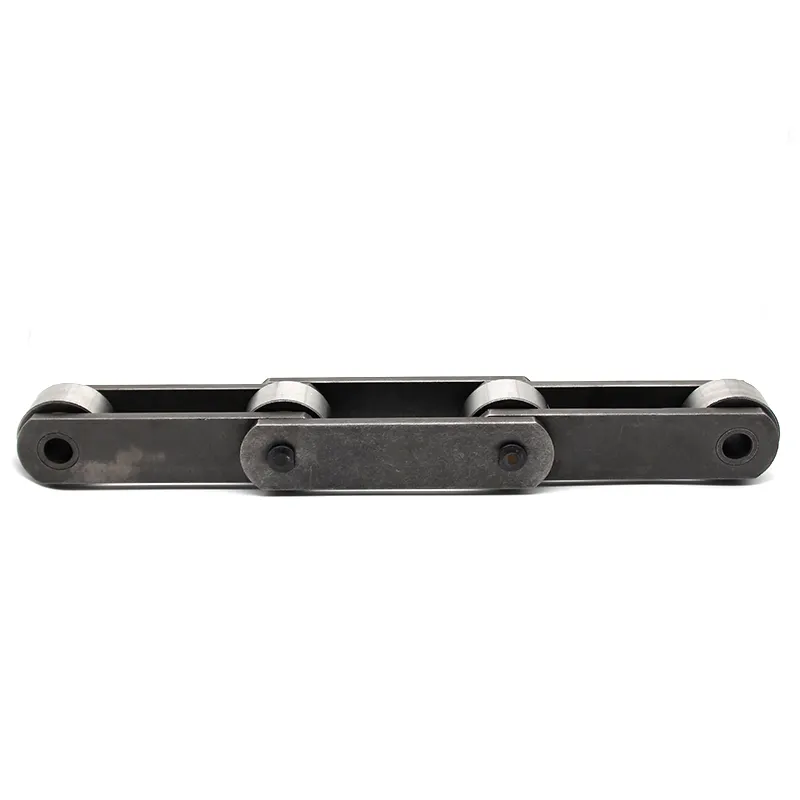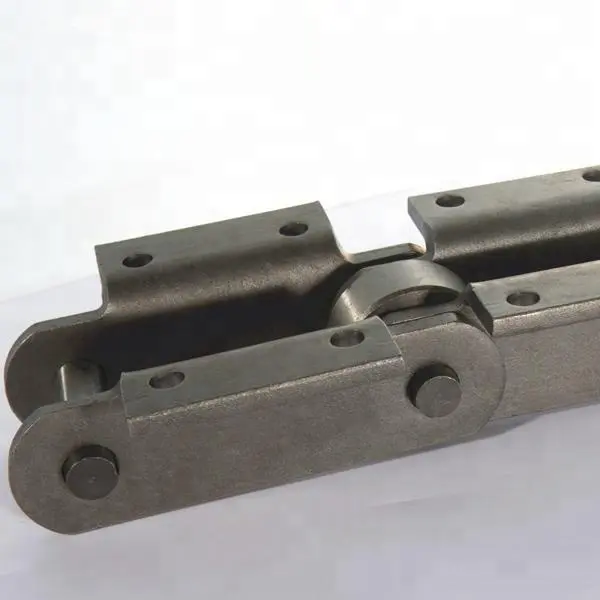Product Description
Product advantages:
| — Ten CoreTechnologies — | |||
| 1 | Chain strengh preload technology | 2 | Pin CRV treatment technology |
| 3 | Plate smoothly punching technology | 4 | Bush oil hole technology |
| 5 | Vacuum Oiled Technology | 6 | Precision Punching Technology |
| 7 | Low frequency fatigue test technology for lange size chain | 8 | Chain length comparison technology |
| 9 | Variation of silence design technology | 10 | Chain dynamic testingtechnology technologies |
Our Advantages:
1. Any inquiry you make will be answered professionally within 6~8 hours.
2. Attaches great importance to product quality and approved by many global quality system certification,such as France, Norway, Germany.
3. Focused on Chain since 1999, have rich experience in Production.
4. High-quality workers,First-class advanced equipment,good quality control,advanced technology.
5. Be Good at Custom-Made Products, provide customized services for customers.
6. Participated in the drafting of 24 national and industrial standards such as chains.As of 2571-Mar, CHOHO has 180 authorized patents.
7. With the responsibility of “Providing high quality chain system with the same service life for the global locomotive industry”, have established a strong R&D team.
By 2571,CHOHO has more than 2,7.
-CHOHO has 4 subsidiaries, including testing technology and international trading companies. has 4 factories in HangZhou, Thailand factory, ZheJiang R&D Center and Tokyo R&D Center. In addition, CHOHO ZHangZhoug Industrial zone is expected to be completed & put into operation next year.
-We specialized in producing all kinds of standard chains and special chains, such as Agricultural Chain, Sprocket, Chain Harrow, Tillage Parts,Rice Harvester Chain, GS38 Chain, Roller Chain, Automobile Chain, Motorcycle Chain Industrial Chain and so on.Our partners among world top enterprises, such as LOVOL,JOHN DEERE,NEWHOLLAND, CLASS,AGCO,DEUTZFAHR,HONDA, KUBOTA etc.
FAQ:
1. Are you manufacturer or trade Company?
We are a factory focused on producing and exporting Chain over 23 years,have a professional international trade team.
2. What terms of payment you usually use?
T/T 30% deposit and 70% against document, L/C at sight
3. What is your lead time for your goods?
Normally 30~45 days.Stock can be shipped immediately.
4. Do you attend any Show?
We attend Hannover show in Germany, EIMA in Italy, CZPT in France, CIAME in China and many other Agricultural machinery shows.
5.Do you offer free samples?
Yes,we can.or you just bear the shipping cost.
6.Is OEM available?
Yes, OEM is available. We have professional designers to help you design.
|
Shipping Cost:
Estimated freight per unit. |
To be negotiated |
|---|
| Standard or Nonstandard: | Standard |
|---|---|
| Application: | Conveyer Equipment, Agricultural Machinery |
| Surface Treatment: | Polishing |
| Samples: |
US$ 1/Meter
1 Meter(Min.Order) | Order Sample |
|---|
| Customization: |
Available
| Customized Request |
|---|
How do mill chains perform in corrosive environments, such as chemical processing plants?
Mill chains are designed to perform well in corrosive environments, including chemical processing plants, where exposure to aggressive chemicals and corrosive substances is common. Here’s a detailed explanation of how mill chains perform in such corrosive conditions:
1. Corrosion-Resistant Materials: Mill chains are often made from stainless steel or other corrosion-resistant materials. Stainless steel, in particular, contains chromium, which forms a passive oxide layer on the surface, providing excellent corrosion resistance to many chemicals found in chemical processing plants.
2. Resistance to Chemicals: Mill chains made of stainless steel or other suitable materials exhibit resistance to a wide range of chemicals, including acids, alkalis, and various corrosive substances used in chemical processes. This resistance helps prevent chain degradation and elongation, ensuring a longer service life.
3. Enhanced Durability: The corrosion-resistant properties of mill chains contribute to their overall durability in corrosive environments. They can withstand exposure to aggressive chemicals without experiencing significant deterioration or weakening.
4. Low Maintenance: Mill chains used in chemical processing plants generally require minimal maintenance due to their ability to resist corrosion. This low maintenance characteristic is beneficial in industrial settings where downtime for repairs can be costly.
5. Reliability: In chemical processing plants, reliable equipment is essential for efficient and safe operations. Corrosion-resistant mill chains provide reliable performance, reducing the risk of unexpected chain failure or breakdowns.
6. Material Selection: Proper material selection is crucial when choosing mill chains for chemical processing plants. Engineers and plant operators should consider the specific chemicals used in their processes and select the appropriate chain material to ensure optimal performance and longevity.
7. Resistance to Temperature Extremes: Some chemical processing applications involve extreme temperatures. Mill chains made from high-quality materials can maintain their performance and integrity under such temperature variations, ensuring smooth operation even in challenging conditions.
8. Customization: Mill chains can be customized to suit the specific requirements of chemical processing plants, such as varying chain pitch, attachments, and strength levels to handle different loads and applications.
Overall, mill chains are a reliable choice for corrosive environments, including chemical processing plants. Their corrosion resistance, durability, low maintenance, and ability to withstand various chemicals make them well-suited for handling the demands of chemical processing applications.
How do mill chains handle the movement of materials with varying shapes and sizes?
Mill chains are designed to handle the movement of materials with varying shapes and sizes in industrial applications. They are well-suited for conveying bulk materials, including granular, powdery, and irregularly shaped substances. The design and construction of mill chains enable them to efficiently transport materials with different physical forms. Here’s how mill chains handle such materials:
- Flexible and Versatile: Mill chains are flexible and can adapt to the shape and size of the materials they are conveying. The links in the chain can move and adjust to accommodate irregularly shaped objects.
- Uniform Material Transfer: The evenly spaced links in the mill chain ensure a smooth and uniform transfer of materials. This prevents material buildup or jamming during the conveying process.
- Various Chain Configurations: Mill chains come in different configurations, such as single strand, double strand, and multiple strand designs. This allows for customized solutions based on the specific material handling requirements.
- Special Attachments: Mill chains can be equipped with various attachments to suit different material handling needs. These attachments can include flights, buckets, or other components that aid in the efficient movement of materials.
- Corrosion and Abrasion Resistance: Depending on the material being conveyed, mill chains can be made from different materials with appropriate coatings or treatments to resist corrosion and abrasion, ensuring longevity and reliability.
- Low Friction: Mill chains are designed to have low friction, reducing the energy required to move materials and minimizing wear on the chain and sprockets.
Overall, mill chains are an essential component of material handling systems in various industries, providing reliable and efficient movement of materials with varying shapes and sizes. Their flexibility, uniform transfer capabilities, and various chain configurations make them suitable for handling diverse materials in industrial processes.
How do you select the right size and type of mill chain for your specific needs?
Selecting the appropriate size and type of mill chain is essential to ensure optimal performance and longevity in material handling systems. Here are the steps to guide you in choosing the right mill chain for your specific needs:
1. Determine the Application Requirements:
Identify the specific requirements of your material handling application. Consider factors such as load capacity, operating speed, environment (indoor or outdoor), temperature range, and potential exposure to chemicals or corrosive substances.
2. Calculate the Load:
Determine the maximum load the mill chain will need to support during operation. The load capacity of the chain should exceed the maximum expected load to ensure safety and prevent premature wear.
3. Consider the Pitch:
The pitch refers to the distance between the centers of two consecutive chain links. Select a mill chain with an appropriate pitch size that matches the sprocket teeth and ensures smooth engagement.
4. Evaluate the Strength:
The strength of the mill chain is crucial for heavy-duty applications. Consider the tensile strength and breaking load of the chain to ensure it can handle the expected loads without deformation or failure.
5. Assess the Material:
Based on the application’s requirements and environment, choose the appropriate material for the mill chain. Options include carbon steel, stainless steel, alloy steel, nickel-plated steel, or plastic/polymer, each with different properties to suit specific conditions.
6. Determine the Lubrication Needs:
Some mill chains may require periodic lubrication to reduce friction and wear. Consider whether lubrication is necessary for your application and select chains that can withstand the lubrication method used.
7. Consult with Experts:
If you are unsure about the suitable mill chain for your specific needs, consult with chain manufacturers or experts in material handling systems. They can provide valuable insights and recommendations based on your application’s requirements.
8. Regular Maintenance:
Ensure proper maintenance and periodic inspection of the mill chain to extend its lifespan and prevent unexpected breakdowns. Regularly lubricate the chain if required and replace any worn or damaged components promptly.
By considering these factors and following the proper selection process, you can choose the right size and type of mill chain that will meet the demands of your specific material handling application and contribute to the overall efficiency and reliability of your system.
editor by CX 2023-09-08




